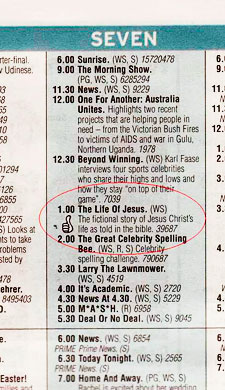Sure. More than one in ten Australians believe the crazy notion that Jesus is a mythical character who never really lived.
But this was not the headline finding from a representative survey of 2500 Australians commissioned by the Centre for Public Christianity (CPX) and conducted by professional pollsters McCrindle Research in the lead-up this week's screening of the Life of Jesus historical documentary.
The real surprise is that out of the 85 percent of Australians who do not identify as 'born again Christians' nearly half of these 'unbelievers' say they think Jesus rose from the dead.
Given the perpetual misinformation about the historical Jesus and a secular media which highlights every nutbar theory, it is surprising the sceptics are so few.
Yet the credibility of John Dickson's history work is reaching new heights. He was even featured as the academic expert on crucifixion on Richard Glover's self-improvement segment.
So when media stupidity perpetuates the ignorance - it is better to laugh.
With a truckload of irony the Sydney Morning Herald‘s Easter week TV supplement ‘The Guide’ included the following explanation next to Channel Seven’s screening time for the documentary: “The fictional story of Jesus Christ’s life as told in the Bible”.

Even more strangely, ‘The Guide’ actually gives the program a ‘thumbs up’.
Contrary to ‘The Guide’'s claims, John Dickson's documentary aims to correct the misinformation around Christ's life, especially the shoddy historical claims by New Atheists like Christopher Hitchens and Richard Dawkins that Jesus never lived.
In turn these atheist writers are picking up ideas perpetuated by liberal theologians like John Shelby Spong.
If nothing else the McCrindle findings reinforce how woefully misguided are the assumptions behind the liberal 'outreach' program. Spong and others seek to play down the 'supernatural' aspects of Jesus' life and ministry because they believe this will make the Christian message more acceptable to secular Westerners.
And yet a majority of Aussies have no problem believing Jesus had special divine powers and performed miracles such as healings.
In fact even amongst those who do not see themselves as 'born again' more than 40 percent said they believe he had divine powers.
In other words nearly half of non-believers reject the views of the material rationalists.
This finding was a great shock to the CPX team.
As John Dickson told ABC's The World Today : "We expected to see an increased scepticism toward all things Christian. But what we really were surprised about is the enduring belief that’s out there - so 42 percent of Australians who aren’t born-agains think that Jesus had divine powers. I mean, I was floored by that."
There is clearly a widespread acceptance of a supernatural reality in Australian culture despite the encroaching secularism.
What Aussies really think about Jesus
In chatting through the findings with CPX co-director Greg Clarke I think perhaps the most helpful aspect of the research for ministry are the findings which provide a snapshot of mainstream Australia's perceptions about Jesus.
As illustrated by Dickson's comment above, the average Aussie's image of Jesus is not the one that Christian apologists and communicators often assume.
So apart from his miraculous healings, what else do most Australians believe about Jesus?
The most well known saying of those listed by the researchers was: "I have come that you may have life."
Dr Clarke says it’s clear that people have positive association about Jesus.
Indeed well over 80 percent of Australians know that Jesus taught us to 'love' others
"People are still familiar with the saying of Jesus - at least the vibe of them," says Dr Clarke.
Though, perhaps more disturbingly, a quarter of Australians think Jesus taught, "God helps those who help themselves" - which is actually a quote from Benjamin Franklin, who was not a Christian but arguably a deist.
This last finding is an interesting insight into the very strong self-reliant deist strand within one section of Australian society.
What ministry lessons do others draw from these findings?


























